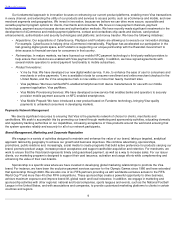Visa 2012 Annual Report Download - page 21
Download and view the complete annual report
Please find page 21 of the 2012 Visa annual report below. You can navigate through the pages in the report by either clicking on the pages listed below, or by using the keyword search tool below to find specific information within the annual report.
Table of Contents
more of them, this could have a material adverse effect on our financial condition and cash flows, or, in certain circumstances, even
cause us to become insolvent.
The principal remaining covered litigation involves interchange reimbursement fees. Since 2005, approximately 55 class
actions and individual complaints have been filed on behalf of merchants against us, MasterCard and/or other defendants, including
certain financial institutions that issue Visa-branded payment cards and acquire Visa-branded payment transactions in the U.S. We
refer to this as the interchange litigation. Among other antitrust allegations, the plaintiffs have alleged that Visa's setting of default
interchange rates violated federal and state antitrust laws. The lawsuits were transferred to a multi-district litigation in the U.S.
District Court for the Eastern District of New York.
The plaintiffs in the interchange litigation seek damages for alleged overcharges in merchant discount fees as well as
injunctive and other relief. The consolidated class action complaint alleges that the plaintiffs estimate that damages will range in the
tens of billions of dollars. Because these lawsuits were brought under the U.S. federal antitrust laws, any actual damages will be
trebled.
The allocation of any monetary judgment or a settlement among the defendants is governed by an omnibus agreement dated
February 7, 2011. See Note 3—Retrospective Responsibility Plan and Note 21—Legal Matters to our consolidated financial
statements included in Item 8 of this report. The Visa portion of a settlement or judgment covered by the omnibus agreement would
be allocated in accordance with specified provisions of our retrospective responsibility plan.
The Company's litigation escrow account currently contains an amount that covers our exposure in the interchange litigation
as negotiated with the class plaintiffs. On October 19, 2012, we signed settlement agreements in these cases, including an
agreement to pay approximately $4 billion to the class plaintiffs. The court granted preliminary approval of the settlement
agreement with the class plaintiffs on November 9, 2012. However, the agreement with the class plaintiffs remains subject to final
court approval and the adjudication of any appeals. We cannot assure that the court will provide final approval of the settlement or
that we will win any appeals.
Failure of our retrospective responsibility plan to insulate us adequately from the impact of such settlements or judgments
could result in a material adverse effect on our financial condition and cash flows. Such a failure could even cause us to become
insolvent. The retrospective responsibility plan addresses only the covered litigation. The plan generally does not cover other
pending litigation or any litigation that we may face in the future, except for cases that include claims for damages relating to the
period prior to our initial public offering that are transferred for pre-trial proceedings or otherwise included in the interchange
litigation. See — If we are found liable in other pending or future lawsuits, we may have to pay substantial damages. In addition,
non-monetary settlement terms and judgments in the covered litigation may require us to modify the way we do business. See —
Limitations on our business resulting from litigation may materially and adversely affect our revenues and profitability. Therefore,
even if our retrospective responsibility plan provides us with adequate funding to satisfy our obligations with respect to monetary
liabilities from settlements of, and judgments in, the covered litigation, it will not insulate us from the monetary impact of all litigation.
If we are found liable in other pending or future lawsuits, we may have to pay substantial damages.
Like many other large companies, we are a defendant in a number of civil actions and investigations alleging violations of
competition/antitrust law, consumer protection law, or intellectual property law, among others. Examples of such claims are
described more fully in Note 21—Legal Matters to our consolidated financial statements included in Item 8 of this report. Some
lawsuits involve complex claims that are subject to substantial uncertainties and unspecified damages; therefore, we cannot
ascertain the probability of loss or estimate the damages. Accordingly, we have not established allowances for such legal
proceedings.
Private plaintiffs often seek class action certification in cases against us. This is particularly so in cases involving merchants
and consumers, due to the size and scope of our business. If we are found liable in a large class action lawsuit, such as the United
States or Canadian merchant class action lawsuits, monetary damages could be significant. See Note 21—Legal Matters to our
consolidated financial statements included in Item 8 of this report.
If we are unsuccessful in our defense against any material current or future legal proceedings, we may have to pay substantial
damages. This could result in a material and adverse effect on our results of operations, cash flow and financial conditions and
could even cause us to become insolvent.
19
























